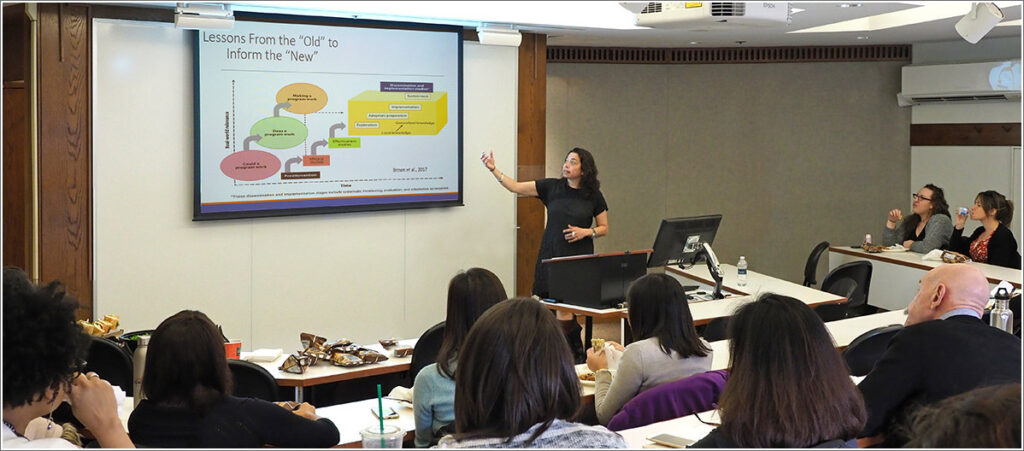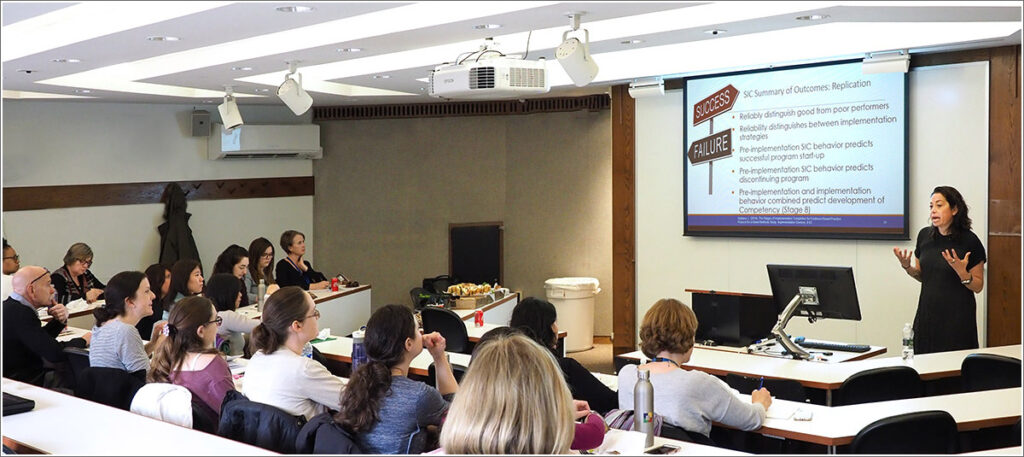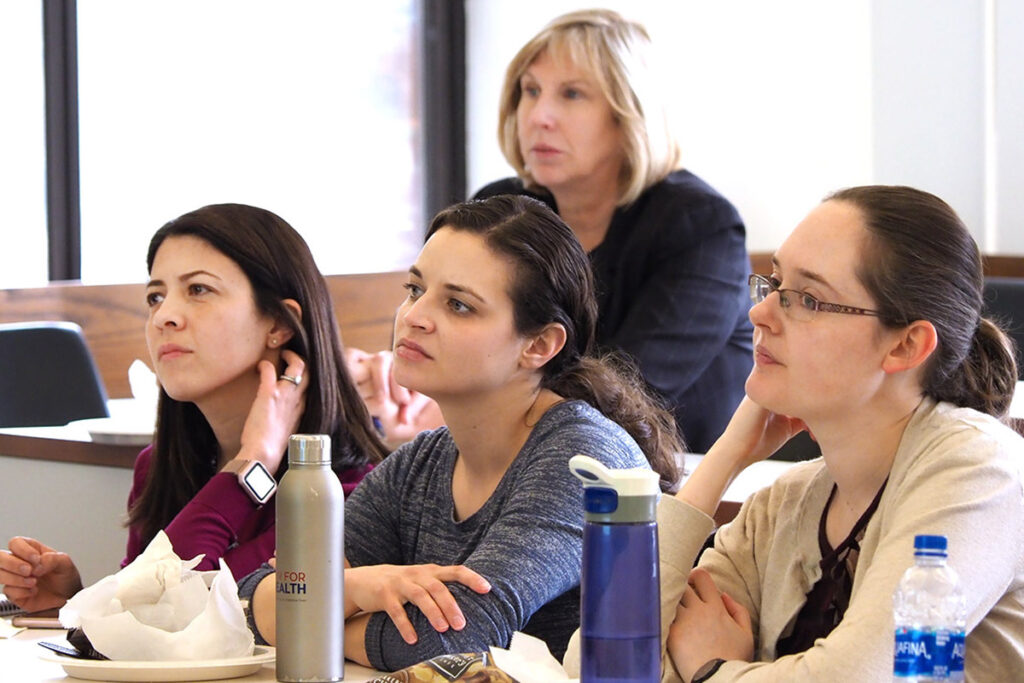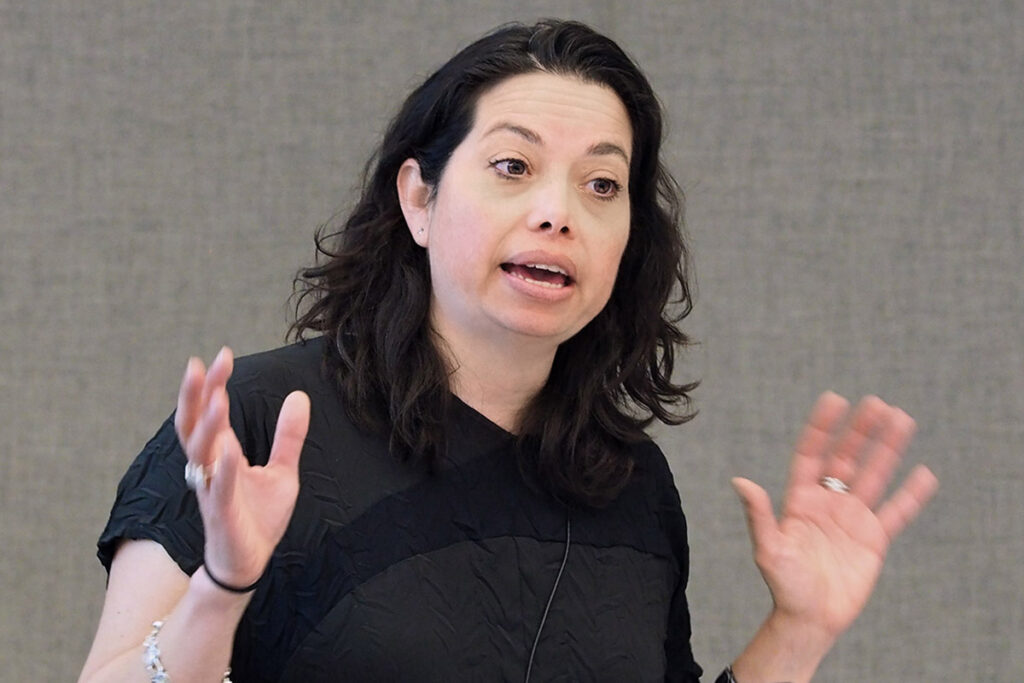News
What’s Missing in Most Health Care-Related Implementation Science Projects
Researcher Lisa Saldana Briefs Penn Implementation Science Center Seminar

Hosted by the University of Pennsylvania Implementation Science Center at the Leonard Davis Institute (PISCE@LDI), implementation process pioneer Lisa Saldana, PhD (above), presents the SIC system she and her colleagues developed to plan and manage evidence-based implementation projects in various areas of clinical practice.
Convincing a clinical staff anywhere to cease using an ineffective practice in favor of adopting an evidence-based replacement has been one of American medicine’s most intractable challenges. As the new field of implementation science has evolved over the last twenty years, one reality has become obvious. Merely declaring that a department or staff should adopt a new practice or procedure has little chance of success unless that effort is properly planned, coached, exactly measured, and effectively managed toward long-term sustainability.
Lisa Saldana, Senior Research Scientist at the Oregon Social Learning Center (OSLC), is a clinical psychologist who has been working on a comprehensive system for achieving this over the last two decades. Her address as featured speaker at the PISCE@LDI seminar filled LDI’s auditorium with an audience of scientists from across Penn’s schools keenly interested in understanding more about Saldana’s “SIC” implementation system.
Welcoming attendees to the seminar was PISCE@LDI Director Rinad Beidas, PhD (above, left), Associate Professor of Psychiatry at the Perelman School of Medicine and LDI Senior Fellow. She explained that in 2011, Saldana, along with OSLC Science Director Patty Chamberlain, PhD, published the results of their pioneering experiment to determine how best to measure the actual progress of an implementation project.
Measuring the process
“The big problem back then was that there was a lot of talk about implementation but no real way of measuring that process,” said Beidas. “Dr. Saldana figured out how to measure one practice, then developed a universal system to measure across multiple practices and now, she’s using that same system to coach people through the implementation process.”
Above, right, in the audience were Melanie Pellecchia, PhD, Assistant Professor of Psychiatry at the Perelman School of Medicine; Courtney Benjamin Wolk, PhD, Assistant Professor of Psychiatry at Perelman and LDI Senior Fellow; Nancy Hodgson, RN, PhD, FAAN, Associate Professor and Chair of Gerontology at Penn School of Nursing and LDI Senior Fellow; and Gwendolyn Lawson, PhD, Postdoctoral Fellow at the Penn Center for Mental Health.
Above, left, Saldana explains her “Stages of Implementation Completion” or “SIC” system that monitors an implementation effort through eight stages involving 46 different activities. Included are administrative actions, staff behaviors and infrastructure-related items. “It’s about treatment and intervention fidelity,” she said. “We think about the mechanisms of action. What is it that makes the intervention work? What is the underlying structure of that fidelity measure? What is it that we’re trying to hold true to?”
Correct focus
“A lot of people stop thinking about implementation at the point when there are boots on the ground and the implementation begins,” Saldana continued. “But the goal needs to be follow-through thinking focused not on achieving a positive intervention outcome, but rather achieving a positive implementation outcome.”
Above right, in the audience are Meghan Lane-Fall, MD, MSHP, Assistant Professor of Anesthesiology and Critical Care at Perelman and LDI Senior Fellow; Linda Fleisher, PhD, MPH, Center for Injury Research and Prevention Senior Scientist at Children’s Hospital of Philadelphia and LDI Senior Fellow; Vivian Byeon, Clinical Research Coordinator at the Penn Center for Mental Health; Mary Phan, BA, Clinical Research Coordinator at the Penn Center for Mental Health; and Rinad Beidas.

Saldana explained that the eight stages of monitoring go from pre-implementation planning, through the full-length implementation process, to proven sustainability. “The SIC,” she said, “produces three scores — duration score, proportion of completion score, and stage score.” She noted that one of the most common reasons cited for an implementation failure is “personnel turnover” but said it was more complicated than that. Her studies have found that different results can occur depending on who is turning over as well as the timing of specific turnovers during an implementation effort.
New PCORI grant
Saldana will also be working with Penn Medicine researchers and LDI Senior Fellows Shreya Kangovi, MD, MSHP (principal investigator), Judith Long, MD, and Rinad Beidas on a newly-awarded PCORI grant for the implementation of Kangovi’s IMPaCT Community Health Worker program in Veterans Administration Centers in Wilmington, Del., and Pittsburgh, Pa., as well as North Carolina’s new Medicaid program.



